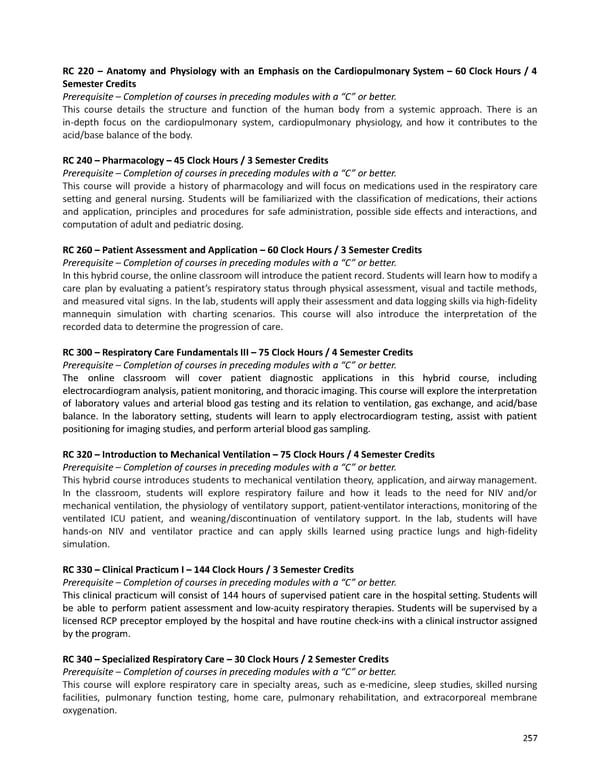RC 220 – Anatomy and Physiology with an Emphasis on the Cardiopulmonary System – 60 Clock Hours / 4 SemesterCredits Prerequisite – Completion of courses in preceding modules with a “C” or better. This course details the structure and function of the human body from a systemic approach. There is an in-depth focus on the cardiopulmonary system, cardiopulmonary physiology, and how it contributes to the acid/base balance of the body. RC240–Pharmacology–45ClockHours/3SemesterCredits Prerequisite – Completion of courses in preceding modules with a “C” or better. This course will provide a history of pharmacology and will focus on medications used in the respiratory care setting and general nursing. Students will be familiarized with the classification of medications, their actions and application, principles and procedures for safe administration, possible side effects and interactions, and computationofadultandpediatricdosing. RC260–PatientAssessmentandApplication–60ClockHours/3SemesterCredits Prerequisite – Completion of courses in preceding modules with a “C” or better. In this hybrid course, the online classroom will introduce the patient record. Students will learn how to modify a care plan by evaluating a patient’s respiratory status through physical assessment, visual and tactile methods, and measured vital signs. In the lab, students will apply their assessment and data logging skills via high-fidelity mannequin simulation with charting scenarios. This course will also introduce the interpretation of the recordeddatatodeterminetheprogressionofcare. RC300–RespiratoryCareFundamentalsIII–75ClockHours/4SemesterCredits Prerequisite – Completion of courses in preceding modules with a “C” or better. The online classroom will cover patient diagnostic applications in this hybrid course, including electrocardiogram analysis, patient monitoring, and thoracic imaging. This course will explore the interpretation of laboratory values and arterial blood gas testing and its relation to ventilation, gas exchange, and acid/base balance. In the laboratory setting, students will learn to apply electrocardiogram testing, assist with patient positioning for imaging studies, and perform arterial blood gas sampling. RC320–IntroductiontoMechanicalVentilation–75ClockHours/4SemesterCredits Prerequisite – Completion of courses in preceding modules with a “C” or better. This hybrid course introduces students to mechanical ventilation theory, application, and airway management. In the classroom, students will explore respiratory failure and how it leads to the need for NIV and/or mechanical ventilation, the physiology of ventilatory support, patient-ventilator interactions, monitoring of the ventilated ICU patient, and weaning/discontinuation of ventilatory support. In the lab, students will have hands-on NIV and ventilator practice and can apply skills learned using practice lungs and high-fidelity simulation. RC330–ClinicalPracticumI–144ClockHours/3SemesterCredits Prerequisite – Completion of courses in preceding modules with a “C” or better. This clinical practicum will consist of 144 hours of supervised patient care in the hospital setting. Students will be able to perform patient assessment and low-acuity respiratory therapies. Students will be supervised by a licensed RCP preceptor employed by the hospital and have routine check-ins with a clinical instructor assigned bytheprogram. RC340–SpecializedRespiratoryCare–30ClockHours/2SemesterCredits Prerequisite – Completion of courses in preceding modules with a “C” or better. This course will explore respiratory care in specialty areas, such as e-medicine, sleep studies, skilled nursing facilities, pulmonary function testing, home care, pulmonary rehabilitation, and extracorporeal membrane oxygenation. 257
 2023-2024 | Catalog Page 256 Page 258
2023-2024 | Catalog Page 256 Page 258